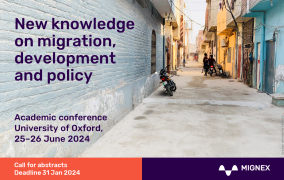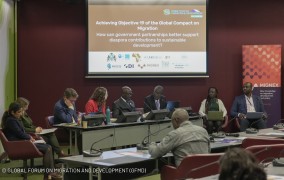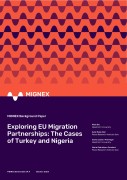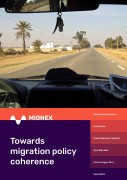MIGNEX Insight
What’s next for EU policy on migration and development?
Reflections from the MIGNEX Policy Conference.
In April, MIGNEX convened a major Policy Conference on future EU migration and development policy, in partnership with ODI. We gathered 120 experts from diverse sectors across and beyond Europe, including the EU Directorate-Generals, the EU Parliament, the Commission, Member State and Partner Country Ministries, Embassies, civil society, academia and media.
We are hugely thank you to all who joined us, and those who made formal interventions in the discussions. Here we share a brief summary of our discussions on longstanding and emerging EU policy agendas - and the main recommendations that emerged.
Policy coherence – for whom?
The ideal of “policy coherence” in the field of migration has evolved over time: from a broad conception of the interlinkages between migration and development, to a neutral term meaning more efficient coordination across different policy areas. More recently, it’s a term signalling the efficiency of migration policies – and in practice – the efficiency of return and readmission agreements.
Readmission agreements are currently not working, and are unlikely to, given the current scale of migration flows. And as they are currently set up, readmission agreements have the potential to breach international norms and laws in various ways. This is where the need to provide legal pathways comes into the picture.
The question of coherence can appear differently for different actors – whether Member States, partner countries, host populations, migrants themselves or societies of emigration. Accordingly, cooperation schemes need to not only pursue EU migration management goals, from top-down, but also understand the domestic policy interests of their potential partners – for instance, in light of the remittances they receive from the members of their diaspora.
Watch out for our forthcoming MIGNEX Report on this topic - Towards migration policy coherence - in June.
Carlos Vargas-Silva, Maria Gabrielson Jumbert and Marie Godin
Should the EU give up on readmission agreements as a foreign policy tool?
Should the EU give up on readmission agreements as a foreign policy tool? Addressing this question requires us to define a measure of success for these agreements.
Unfortunately, to date, there is no consensus, nor any practical proposal on how this should be measured. In fact, some current EU funding mechanisms may be sustaining the structures and conditions that make people flee in the first place; contending with domestic development goals and the EU’s policy goals of addressing insecurity. A few ideas could help to increase the potential positive impacts of readmission agreements.
First, we need more transparency on how these agreements are created; better understanding of what is funded and for which purposes together with the conditions imposed by the EU could help to shape these agreements for the better.
Second, there needs to be more involvement of partner countries throughout the whole process. This would prevent agreements that seem to only be “imposed” by the EU without consideration of the views of the citizens in the partner countries. This in turn could increase the likelihood of success.
Maria Gabrielson Jumbert and Ayşe Bala Akal
The causes of migration
Currently, the term ‘root causes’ carries negative connotations in policy circle, with the view of migration as an issue that can - and should - be addressed. The MIGNEX definition of root causes is: widely experienced hardships to which migration is a possible response, that are perceived to be persistent, immediately threatening, or both. New MIGNEX research on the Causes of Migration offers seven key insights that are important, but potentially unpopular, for policymakers on this agenda.
There are wide-ranging drivers of migration and current policy initiatives on ‘root causes’ are often misguided. Critically, migration is shaped by many factors all at once with the ‘root causes’, as concieved in current policy approaches, making up only some of the drivers of migration. The large effect of corruption on migration aspirations was deemed most surprising, and as noted by delegates, emboldens existing calls for a revival of the good governance agenda.
The link between migration and corruption is important. Fighting corruption is also a major task of the Council of Europe because it undermines democracy.
Leyla Kayacik, Former Special Representative for Migration and Refugees, Council of Europe.
There were also concerns raised about the minimum 10% spend on migration in the EU’s latest development budget. Development initiatives should remain focused on the reduction of hardships – i.e. reducing poverty, improving wellbeing etc – and should not be hijacked by migration objectives.
Jessica Hagen-Zanker and Nicolás Caso
The developmental impacts of migration
Migration and development are intrinsically connected. Yet when it comes to the EU’s migration and development policy agenda, there is currently too much focus on the migration aspect. New MIGNEX research on the Development Impacts of Migration offers six critical reflections for future initiatives.
For one, migration as the main entry point for cooperation with partner countries does not work. We firstly need to focus on human mobility overall and integrate it more holistically into general societal shifts taking place at the global level, such as processes of urbanization and impacts of the climate crisis.
Additionally, in order to ensure policy coherence on migration and development, it is important to look at development in both the country of origin and country of destination. There is huge potential for skills mobility partnerships, but the way they are currently designed benefits the countries of destination much more than the country of origin. Additionally, we need to think about making these partnerships more sustainable and bring in the private sector.
Finally, the link between readmissions or returns and development assistance needs to be de-coupled. Forcibly returned people are among the most vulnerable, and this type of return will not lead to development.
Migration is a force for good, but the issue is that those benefits are not guaranteed and not equally shared. How can we ensure that it is? Cécile Riallant, Director, Department of Peace and Development Coordination, International Organisation for Migration (IOM).
Melissa Siegel, Marcela Rubio and Katrin Marchand
How can governments better support diaspora contributions to sustainable development?
What are the wide-ranging impacts of the diaspora on development, at the community and country-level? How can governments of origin and destination better enable and foster the positive impacts?
Creating an “enabling environment” was noted as challenging, but absolutely critical. This does not only mean sound economic policies – though making it easier to do business or paying decent wages helps to attract diaspora contributions – but also engaging the diaspora on a more personal level. Ghana, for instance, has reached out to generations of the Ghanian diaspora through its Year of Return policy, with impacts economic as well as social, as we heard from Ghana’s President’s Office.
Critically however, it’s not just origin countries that are important – countries of destination have a key role to play in supporting the diaspora contributions to sustainable development, for instance by including diaspora insights in development corporation.
Jessica Hagen-Zanker and Melissa Siegel
How do Europeans really feel about migration?
ODI's research shows that - in stark contrast to the escalation of hostile rhetoric - attitudes towards immigration are increasingly positive across many European countries, with significant shifts over the last twenty years. In-depth research also confirms that integration policies make a difference: good integration policy is associated with more positive public attitudes to refugees and other migrants.
Reassured by these positive findings, roundtable participants explored the explanations for the divergence between public attitudes, the negative narratives that dominate public discourse and the increasing traction of far-right parties. From the impact of austerity and the hollowing out of public services in driving the far-right vote, to the 'reverse backlash' effect and the impact of social desirability bias on survey results, there was a lively discussion.
Concerns were raised that trends may not remain positive for long given far-right groups have increasingly proved popular with young voters across a number of European countries.
Main takeaways of the discussion included the power of solidarity narratives in enabling a constructive and comprehensive response (as evident with Ukrainian refugees) and the clear conclusion that the research community must collectively do more to enable courageous leadership on the issue of migration in Europe.
Claire Kumar, ODI
(Mis)managing transit migration? Lessons from the European neighbourhood
What’s next for EU transit migration management, especially in light of the EU Pact on Migration and Asylum?
Future EU approaches must draw on the lessons of policy initiatives to date. We unpacked the current relevance of transit migration management in relation to the processes of externalization of EU migration policies and their impacts on the wider EU neighbourhood - and several recommendations emerged.
In managing transit migration, we need to focus on all people, including children on the route, by conceptualising protection as a global good. The example of Ukrainian refugees teaches us that there are different ways to handle transit migration management. As the Ukrainian case has shown, when legal pathways are possible, people (and especially children) on the move experience much less border violence.
As it stands, the New Pact may not improve the current protection gaps on the route, because stricter border procedures to create deterrence risk creating hot spots in transit countries in the European neighbourhood.
Further, we need to take into account the interests of transit countries and strike more comprehensive agreements combining trade, mobility, security, development related interests of both parties, based on equal and balanced partnerships. There is also a need for transparency in the management of transit migration, so that public funding can be traced by external monitoring.
Ahmet İçduygu, Ayşen Üstübici and Zina Weisner
Keynote speakers
Ambassador Luigi Soreca, Special Envoy for External Dimension of Migration, European External Action Service
Shada Islam, Commentator on EU Affairs
Concluding remarks
Whether migration has positive or negative effects is highly dependent on the choices facing policymakers across and beyond the EU today.
At a time of much uncertainty and polarisation, this policy conference offered a much-needed space for open dialogue. And after 6 years of intensive MIGNEX research, we left with a sense of optimism: that credible evidence can shape important policy conversations – and is valued by policymakers too.
You can explore the research highlighted above, and much more, here. And don’t hesitate to reach out to any of us directly, to discuss in more detail.



